Participants
Kate Sanders
Kate Sanders is Professor (as of July 1, 2009) at the Mathematics and Computer Science Department at Rhode Island College in Providence, Rhode Island. She received an A.B. in classics from Brown University, a J.D. from Harvard University, and a Ph.D. in computer science from Brown University, with a thesis on artificial intelligence and law. In recent years, her main research interest has been empirical computer-science education. She participated in the Bootstrapping Computer Science Education workshop in 2002-2003, and has published in SIGCSE, ITICSE, ICER, and CSEJ. She is the co-author (with A. van Dam) of "Object-Oriented Programming in Java: a graphical approach".
Rajeev Agrawal
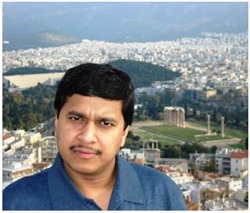 Rajeev Agrawal completed his PhD from
Department of Computer Science, Wayne State
University, Detroit in May 2009. His Dissertation
title was ‘Narrowing down the Semantic Gap
Between content and Context Using Multimodal
Keywords’. His research interests are
Content-based Image Clustering and Retrieval, Data
Mining, Machine Learning, Personal Privacy and
Security Issues besides computer science education
research. He has worked at EDS, an HP Company in
Business Intelligence group and worked on SLA
management for Airline Industry. He also worked on
Medicaid Management Information System (MMIS) for
Oregon State. He will join Grand Valley State
University, Grand Rapids Michigan in Fall 2009 as
Visiting Assistant Professor and interestingly teach
2 sections of CS 2 course. He has completed his BS
and MS in Computer Science from India. Recently, he
attended Tekkotsu robotics workshop at Carnegie
Mellon, Pittsburgh. He believes that Data Repository
would be the driving force for Computer Science
education research in near future. He is a member of
IEEE, ACM, and ASEE.
Rajeev Agrawal completed his PhD from
Department of Computer Science, Wayne State
University, Detroit in May 2009. His Dissertation
title was ‘Narrowing down the Semantic Gap
Between content and Context Using Multimodal
Keywords’. His research interests are
Content-based Image Clustering and Retrieval, Data
Mining, Machine Learning, Personal Privacy and
Security Issues besides computer science education
research. He has worked at EDS, an HP Company in
Business Intelligence group and worked on SLA
management for Airline Industry. He also worked on
Medicaid Management Information System (MMIS) for
Oregon State. He will join Grand Valley State
University, Grand Rapids Michigan in Fall 2009 as
Visiting Assistant Professor and interestingly teach
2 sections of CS 2 course. He has completed his BS
and MS in Computer Science from India. Recently, he
attended Tekkotsu robotics workshop at Carnegie
Mellon, Pittsburgh. He believes that Data Repository
would be the driving force for Computer Science
education research in near future. He is a member of
IEEE, ACM, and ASEE.
Vicki Almstrum
Stephen Edwards
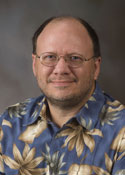 Stephen
Edwards is an associate professor at Virginia Tech. His
research interests are in software engineering, the
use of formal methods in programming languages,
automated testing, component-based approaches, and
computer science education. The largest CS education
project I am currently working on is Web-CAT: the Web-based Center
for Automated Testing. Web-CAT is an open-source
automated grading platform that is used by 20
different institutions. Web-CAT is customizable and
extensible, allowing it to support a wide variety of
programming languages and assessment strategies.
Web-CAT is most well-known as the system that
“grades students on how well they test their
own code,” with experimental evidence that it
offers greater learning benefits than more
traditional output-comparison grading.
Stephen
Edwards is an associate professor at Virginia Tech. His
research interests are in software engineering, the
use of formal methods in programming languages,
automated testing, component-based approaches, and
computer science education. The largest CS education
project I am currently working on is Web-CAT: the Web-based Center
for Automated Testing. Web-CAT is an open-source
automated grading platform that is used by 20
different institutions. Web-CAT is customizable and
extensible, allowing it to support a wide variety of
programming languages and assessment strategies.
Web-CAT is most well-known as the system that
“grades students on how well they test their
own code,” with experimental evidence that it
offers greater learning benefits than more
traditional output-comparison grading.
Mark Hall
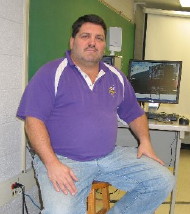 Mark S. Hall is an Assistant
Professor of Computer Science at the University of
Wisconsin - Marathon County where he is in his 6th
and final year on the tenure-track. He holds B.S.
degrees in Mathematics and Computer Science, and a
Masters of Science in Systems Management (MSSM) at
the University of Southern California. He joined the
academic world after 20+ years in software
development for software companies contracting for
the Department of Defense and commercial
applications. During this time, he lived in Japan
for 5 years and Germany for 8 years. His main
research interests involve computer-science
education and algorithm visualizations (JHave). He
is a member of the ACM and SIGCSE, AITP, and CSTA.
He has participated in an ITiCSE working group
(2006), and the working group paper was published in
the ACM "inRoads" journal. He has presented and
published at numerous regional CS Education
conferences (MICS, CCSC-Midwest).
Mark S. Hall is an Assistant
Professor of Computer Science at the University of
Wisconsin - Marathon County where he is in his 6th
and final year on the tenure-track. He holds B.S.
degrees in Mathematics and Computer Science, and a
Masters of Science in Systems Management (MSSM) at
the University of Southern California. He joined the
academic world after 20+ years in software
development for software companies contracting for
the Department of Defense and commercial
applications. During this time, he lived in Japan
for 5 years and Germany for 8 years. His main
research interests involve computer-science
education and algorithm visualizations (JHave). He
is a member of the ACM and SIGCSE, AITP, and CSTA.
He has participated in an ITiCSE working group
(2006), and the working group paper was published in
the ACM "inRoads" journal. He has presented and
published at numerous regional CS Education
conferences (MICS, CCSC-Midwest).
Ray Lister
 Raymond Lister is an Australian who
recently moved to Canada to take up a two year
Teaching and Learning Fellowship at the University
of British Columbia, Vancouver. That fellowship is
part of the Carl Wieman Science Education
Initiative. In 2007, he became an associate fellow
of the Australian Learning and Teaching Council, one
of eight such perpetual fellowships awarded in 2007
to Australian academics across all disciplines. He
has published over 50 peer-reviewed papers in
Computer Science Education. His primary research
interest is the study of novice programmers. Over
the last five years, he has co-led the
multi-institutional BRACElet project, which has
studied novice programmer performance on exam
questions. He sees the Data Repository as possibly
an ideal location place to place some of the data
produced by the BRACElet project, and he also sees
the repository as the mechanism for organising the
BRACElet project in the future.
Raymond Lister is an Australian who
recently moved to Canada to take up a two year
Teaching and Learning Fellowship at the University
of British Columbia, Vancouver. That fellowship is
part of the Carl Wieman Science Education
Initiative. In 2007, he became an associate fellow
of the Australian Learning and Teaching Council, one
of eight such perpetual fellowships awarded in 2007
to Australian academics across all disciplines. He
has published over 50 peer-reviewed papers in
Computer Science Education. His primary research
interest is the study of novice programmers. Over
the last five years, he has co-led the
multi-institutional BRACElet project, which has
studied novice programmer performance on exam
questions. He sees the Data Repository as possibly
an ideal location place to place some of the data
produced by the BRACElet project, and he also sees
the repository as the mechanism for organising the
BRACElet project in the future.
Robert McCartney
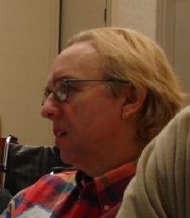 Robert McCartney is an Associate
Professor of Computer Science and Engineering at the
University of Connecticut. He earned B.S. and M.S.
degrees in Natural Resources at the University of
Michigan, worked as a statistician at the
Smithsonian Institution, and earned Sc.M. and Ph.D.
degrees in Computer Science from Brown University.
His main research interests involve empirical
computer science education research, most recently
work on threshold concepts and student
preconceptions about computing. His other research
interests include diagrammatic reasoning and
underwater robotics. He is currently co-editor in
chief of ACM JERIC, and was on the editorial board
of Computer Science Education from 1998-2006.
Robert McCartney is an Associate
Professor of Computer Science and Engineering at the
University of Connecticut. He earned B.S. and M.S.
degrees in Natural Resources at the University of
Michigan, worked as a statistician at the
Smithsonian Institution, and earned Sc.M. and Ph.D.
degrees in Computer Science from Brown University.
His main research interests involve empirical
computer science education research, most recently
work on threshold concepts and student
preconceptions about computing. His other research
interests include diagrammatic reasoning and
underwater robotics. He is currently co-editor in
chief of ACM JERIC, and was on the editorial board
of Computer Science Education from 1998-2006.
Briana Morrison
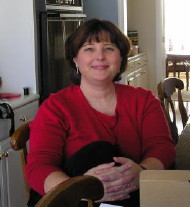
 After earning a
B.S. in Computer Engineering from Tulane University,
Briana Morrison worked for IBM in Atlanta for 8
years. During her career at IBM she was a software
developer, team lead for customer support, and
developed and led in-house training for developers
and customers on object-oriented programming and
specific products. While earning a M.S. in Computer
Science from Southern Tech, she was also a graduate
instructor and after graduating became an adjunct
instructor. She began her full-time position at SPSU
in January of 1996. She was the faculty lead for a
successful ABET accreditation evaluation which
resulted in initial accreditation for the BS in
Computer Science program. She is currently
Undergraduate Coordinator for the Computer Science
and Software Engineering programs. Her research
interests include Computer Science Education, gaming
in education, gender issues in computer science, and
Data Structures.
After earning a
B.S. in Computer Engineering from Tulane University,
Briana Morrison worked for IBM in Atlanta for 8
years. During her career at IBM she was a software
developer, team lead for customer support, and
developed and led in-house training for developers
and customers on object-oriented programming and
specific products. While earning a M.S. in Computer
Science from Southern Tech, she was also a graduate
instructor and after graduating became an adjunct
instructor. She began her full-time position at SPSU
in January of 1996. She was the faculty lead for a
successful ABET accreditation evaluation which
resulted in initial accreditation for the BS in
Computer Science program. She is currently
Undergraduate Coordinator for the Computer Science
and Software Engineering programs. Her research
interests include Computer Science Education, gaming
in education, gender issues in computer science, and
Data Structures.
Jan Erik Mostr÷m
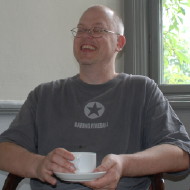 Jan Erik Mostr÷m works as a Lecturer
at the Department of
Computing Science at Umeň University, Sweden. He
got his M.Sc. in Computer Science from Luleň Technical University
and a Licentiate of Technology from Umeň
University.
Jan Erik Mostr÷m works as a Lecturer
at the Department of
Computing Science at Umeň University, Sweden. He
got his M.Sc. in Computer Science from Luleň Technical University
and a Licentiate of Technology from Umeň
University.
His main research interests are computer-science education research and empirical studies of programmers. He participated in the Scaffolding Computer Science Education workshop in 2003-2004, the Stepping Stones workshop in 2006-2007 and has published in SIGCSE, ITICSE, ICER, and CSEJ.
Brad Richards
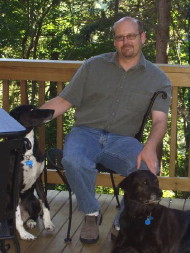 Brad Richards is an Associate
Professor of Computer Science at the University of Puget Sound.
He holds B.A. degrees in Physics and Computer
Science, an M.Sc. in CS from the University of
Victoria, and earned his Ph.D. in Computer Science
from the University of Wisconsin – Madison.
His main research interests involve emprical
computer-science education research. He participated
in the Bootstrapping Computer Science Education
workshop in 2002-2003, is a member of the Liberal
Arts Computer Science Consortium (LACS), and has
published in SIGCSE, ITICSE, and JERIC.
Brad Richards is an Associate
Professor of Computer Science at the University of Puget Sound.
He holds B.A. degrees in Physics and Computer
Science, an M.Sc. in CS from the University of
Victoria, and earned his Ph.D. in Computer Science
from the University of Wisconsin – Madison.
His main research interests involve emprical
computer-science education research. He participated
in the Bootstrapping Computer Science Education
workshop in 2002-2003, is a member of the Liberal
Arts Computer Science Consortium (LACS), and has
published in SIGCSE, ITICSE, and JERIC.
Beth Simon
Jaime Spacco
Craig Zilles
Craig Zilles is an Assistant Professor in the Computer Science department at the University of Illinois at Urbana-Champaign. His current research focuses on compiler interaction between compilers and computer architecture and computer science education. In his prior work, he developed the first algorithm that allowed rendering arbitrary three-dimensional polygonal shapes for haptic interfaces (force-feedback human-computer interfaces). He holds 6 patents (1 pending), is a winner of the NSF CAREER award, and his work on "atomic execution for compiler optimization" was selected as an IEEE Micro "Top Pick". For his teaching, he has received the Rose Award and Everitt Award for teaching excellence and is routinely elected to the University of Illinois's "List of Teachers Ranked as Excellent by their Students". He received his Ph.D. in 2002 from Wisconsin-Madison.